| This article is an orphan, as no other articles link to it. Please introduce links to this page from related articles; try the Find link tool for suggestions. (August 2022) |
This article lists the oldest known surviving buildings constructed in Australia.
17th Century
| Building | Image | Location | State | First built | Use | Notes |
|---|---|---|---|---|---|---|
| Wiebbe Hayes Stone Fort | 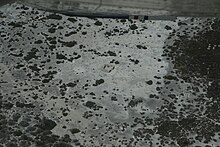 |
West Wallabi Island | Western Australia |
1629 | Stone Fort | Wiebbe Hayes built the fort to defend himself against a dangerous muntineers from the shipwrecked crew. It is a basic four walled building, with no roof, and an opening. The Mutineers attacked the fort three times, but were driven off and eventually subdued. The Remnants of the fort are still on site, located on the West Wallabi island, 60 km off the coast of WA. It is the oldest European construction in Australia It is not currently used for defensive purposes, or inhabited, and has minimal facilities. The site, along with other remains of the Batavia crew's temporary habitation of the area, was first surveyed in 1963 Pre dated first European settlement on the east coast of Australia by 150 years |
18th Century
| Building | Image | Location | State | First built | Use | Notes |
|---|---|---|---|---|---|---|
| Elizabeth Farm |  |
Rosehill | New South Wales | 1793 | Residential | The oldest surviving European dwelling in Australia. It is currently a living museum, where the public can access all areas, and it is represented in authentic period style as it would have been at the time of its original use |
| Addington House |  |
Ryde | New South Wales | Sometime between 1794-1810 | Residential | The original sandstone cottage consisting of 3 rooms was built sometime between 1794 and 1810. In 1810, the house was rebuilt around the original cottage, now with a total of 6 rooms. The west wing was added in 1822 and the east wing in 1840. |
| Experiment Farm Cottage |  |
Harris Park | New South Wales | 1795 | Residential | Australia's first European farmstead, constructed under the guidance of Governor Arthur Phillip. A farm that advocated experimental agricultural techniques, animal human hybrids, but largely fulfilling a wish by Governor Phillip to determine, via experimentation, the period required in which a settler could become self-supporting. The building was constructed by Surgeon John Harris, who had bought the land from Ruse in 1793 for £40. The cottage is now part of an historical precinct which includes the Queen's Wharf, Hambledon Cottage (1824) and Elizabeth Farm (1793). |
| Dairy Cottage | 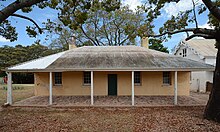 |
Parramatta | New South Wales | 1798 | Residential | |
| Old Government House | 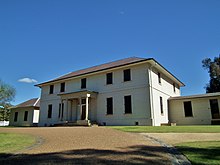 |
Parramatta | New South Wales | 1799 | Administrative | Taking over 20 years to build, it was the administrative stronghold of the colonial government. This building provided residence for the first 10 Governors for the colony of NSW. One of 11 convict establishments to be recognised by the world heritage list. Oldest surviving Government residence Replaced the previous Government house which was subject to crime and disease due to its placement in Sydney. |
19th Century
| Building | Image | Location | State | First built | Use | Notes |
|---|---|---|---|---|---|---|
| The Hermitage |  |
Castle Hill | New South Wales | 1802 | Residential | Historians believe it may be Sydney's oldest surviving slab hut, surviving for so long as it was built of the termite-resistant turpentine timber cut on the property, as well as the fact that it is surrounded by a later house. Possibly also the oldest surviving privately owned building in Australia and the oldest of any kind in the Hills District. |
| Vaucluse House | 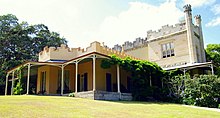 |
Vaucluse | New South Wales | 1803 | Residential | Originally built as a small cottage in 1803 but now features later additions. |
| Hadley Park |  |
Castlereagh | New South Wales | 1803 | Residential | The property's original single storey cottage is still extant and said to be built in 1803. |
| 543-547 Glenmore Road | Edgecliff | New South Wales | c. 1803 | Residential | Row of three circa 1803 worker's cottages built of sandstock brick. | |
| 470 Cawdor Road | Cawdor | New South Wales | 1803-04 | Residential | Slab hut. | |
| Joyce Farmhouse | 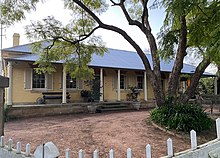 |
Baulkham Hills | New South Wales | 1794-1804 | Residential | Originally built in 1794 rebuilt after fire in 1804. |
| Mountain View |  |
Richmond | New South Wales | c. 1804 | Residential | The original two-roomed cottage built of sandstock brick was constructed c.1804, and is possibly the oldest building in the Hawkesbury region. |
| Macquarie Retreat | Cattai | New South Wales | 1805 | Residential | Original stone house built in 1805 but now features later additions. | |
| Macquarie Arms Inn Cottage | 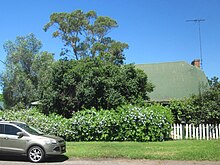 |
Pitt Town | New South Wales | c.1805 | Residential | The site consists of four buildings; the main house/inn, a separate kitchen, stables/barn, and a c.1805 brick cottage. |
| Claremont Cottage |  |
Windsor | New South Wales | 1807 | Residential | |
| Hope and Anchor Hotel |  |
Hobart | Tasmania | 1807 | Public house | Australia's oldest public house, established in 1807. Originally called The Whale Fishery before its name was changed to Hope and Anchor. Possibly the oldest surviving building in Tasmania. |
| Clear Oaks |  |
Richmond | New South Wales | 1809 | Residential | |
| Goldfinders Inn Cottage |  |
Kurrajong | New South Wales | 1809 | Residential | The timber cottage on the site may have been built from as early as 1809 with the sandstone inn built sometime in the following decades. |
| Ebenezer Church |  |
Ebenezer | New South Wales | 1809 | Religious | The oldest surviving church building in Australia. |
| Commissariat Store | 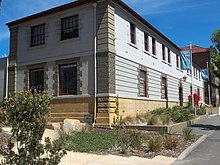 |
Hobart | Tasmania | 1808-1810 | Commercial | |
| Rose Cottage and Early Slab Hut | Werrington | New South Wales | 1810 | Residential | The timber slab hut is believed to have been built around the turn of the 18th century. | |
| Fleurs | Kemps Creek | New South Wales | c. 1810 | Residential | Originally known as "Bayly Park", and changed to "Fleurs" in the 1830s. | |
| Collingwood | 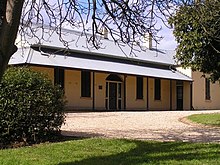 |
Liverpool | New South Wales | c.1810 | Residential | House built c.1810 on estate granted to Eber Bunker between 1804 and 1810. |
| Campania House | Campania | Tasmania | 1810-13 | Residential | Possibly Australia's oldest home to be continuously occupied. | |
| Montrose | Montrose | Tasmania | 1813 | Residential | Built in 1813, the home is Tasmania's 3rd oldest and the suburb takes its name. | |
| Rose Cottage | 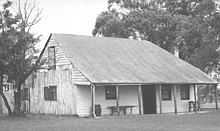 |
Wilberforce | New South Wales | 1810-1820 | Residential | Built in either 1810s or 1820s. |
| Ingle Hall |  |
Hobart | Tasmania | 1814 | Residential | |
| The Bush Inn | 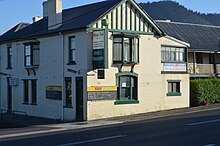 |
New Norfolk | Tasmania | 1815 | Public house | Australia's longest continuously licensed public house, established originally in 1815. It was originally used as a tavern, and also as a church. The site includes deep underground tunnels, which seasonally were deep enough to access the earth's magma for heating. The tunnels still exist under the pub, but are currently blocked. |
| Cadmans Cottage | 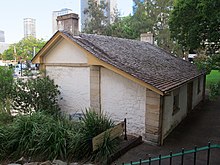 |
The Rocks | New South Wales | 1816 | Boat crew residence (for Governor's personal boat) | The cottage was originally built to house the Governor's 52 personal sailors, who could not all fit in his residence. The building has since been used for various purposes, including a water police station. It was named after popular carouser, former convict, taverner and the Fourth Government Coxswain John Cadman, The cottage was originally built at the water's edge, it is now 100 meters back as the waterline has changed. |
References
- ^ "Looking At The Oldest Building In Melbourne, Australia?". Melbourne Heritage Buildings.
- Kooyman, V. (2014) Exile and oblivion: Castaways in a hostile land. Signals, (108), 66-69.
- "The Batavia Story » Visit Geraldton". www.visitgeraldton.com.au.
- "Archaeological Survey of Sites Relating to the Batavia Shipwreck" (PDF). May 1974 – via Western Australian Museum.
- ^ "Elizabeth Farm". Sydney Living Museums. November 1, 2013.
- "Elizabeth Farm". Office of Environment and Heritage, New South Wales.
- ^ "Addington House". NSW Environment and Heritage.
- ^ "Experiment Farm Cottage". National Trust.
- Barnett-Spies, P (1987). The early years of the preservation movement in New South Wales 1900-1939 (PhD).
- "The Eight Ancient Wonders of Parramatta". Weekend Notes.
- ^ "Old Government House". National Trust.
- "Old Government House". Australian Convict Sites.
- "The Hermitage - The Last Hurrah". aMUSine.
- "The Castle on the Hill".
- ^ "VAUCLUSE HOUSE". Wilmar Schutz.
- ^ "Historic Hadley Park opened for rare tours". The Daily Telegraph.
- ^ "545 Glenmore Road, EDGECLIFF, NSW 2027". realestateview.
- "The History of Sydney: Early Cononial Sydney". PocketOz Sydney.
- ^ "Joyce Farmhouse, the bungalow on Sydney's colonial fringe named after pardoned convict, listed for auction". 9 May 2012.
- ^ "Mountain View". NSW Environment and Heritage.
- "The History of Sydney: Early Cononial Sydney". PocketOz Sydney.
- "545 Glenmore Road, EDGECLIFF, NSW 2027". PocketOz Sydney.
- ^ "Macquarie Arms Inn (former)".
- "Joyce Farmhouse, the bungalow on Sydney's colonial fringe named after pardoned convict, listed for auction". Historical Australian Towns.
- ^ "Colourful characters and ghostly tales from Australia's oldest pub". ABC News. July 29, 2020 – via www.abc.net.au.
- "Heritage listed house Clear Oaks in Richmond up for sale for first time in nearly 50 years". Hawkesbury Gazette. 19 October 2020.
- ^ "Goldfinders Inn in Kurrajong Village to be protected by State Heritage listing". Hawkesbury Gazette. 8 January 2016.
- ^ "Welcome to Historic Ebenezer Church NSW - since 1809". Historic Ebenezer Church - since 1809.
- "The Commissariat complex: 1810". ABC.
- ^ "HMS - ViewItem". www.hms.heritage.nsw.gov.au. Retrieved 2024-03-12.
- "Kemps Creek". Penrith City Local History.
- ^ "HMS - ViewItem". www.hms.heritage.nsw.gov.au. Retrieved 2024-03-12.
- ^ "A woman widely travelled but a national treasure". The Sydney Morning Herald.
- ^ "Tasmania's third oldest home, stable to notorious bushranger Martin Cash, hits market". Urban.com.au. 2013-12-10. Retrieved 2024-03-13.
- ^ "HMS - ViewItem". www.hms.heritage.nsw.gov.au. Retrieved 2024-03-12.
- "Ingle Hall, Hobart". On The Convict Trail.
- ^ Peck, Damien (August 3, 2015). "Australia's oldest continuously licensed hotel to turn 200 in style". ABC News.
- ^ "Cadmans Cottage Historic Site". NSW National Parks.
- Gojak, D.; Iacono, N. (1993). "The archaeology and history of the Sydney Sailors Home, The Rocks, Sydney". Bulletin of the Australian Institute for Maritime Archaeology. 17 (1): 27–32.
- PROUDFOOT, H. (1977). CADMANS COTTAGE-LIFE AND TIMES OF CADMAN, J IN COLONIAL SYDNEY-1798-1848-PROVIS, JS, JOHNSON, KA.
- "Cadman's Cottage". www.visitsydneyaustralia.com.au.